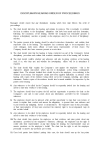Introduction to this document
Disciplinary hearing order of proceedings
Where managers are asked to chair disciplinary hearings, if they’re new to the whole experience, it’s helpful to give them guidance on how the hearing should be conducted. Our document will assist in ensuring they conduct hearings appropriately and cover all the matters that need to be dealt with in a logical and fair order.
Acas Code of Practice
The Acas Code of Practice on Disciplinary and Grievance Procedures sets out the principles of fairness for handling disciplinary and grievance matters in the workplace. This will always include holding a disciplinary hearing with the employee to discuss the disciplinary problem and to give them an opportunity to put their case in response before a decision is taken on whether a penalty will be imposed on them. You must provide written advance notice to the employee of the case against them before the hearing takes place, and supply copies of any evidence, such as witness statements. After the hearing, you should then decide whether or not disciplinary action is justified and inform the employee accordingly in writing.
Right to be accompanied
Under s.10 of the Employment Relations Act 1999, employees have a right, if they make a reasonable request, to be accompanied at the disciplinary hearing by either a fellow worker or a trade union official or trade union representative. If the employee’s chosen companion is not available at the time proposed, and the employee proposes another time that is reasonable and falls within five working days of the one originally proposed, you must postpone the hearing to the date and time proposed by the employee. The companion should be allowed to address the hearing to put and sum up the employee's case, respond on behalf of the employee to any views expressed at the hearing and confer with the employee during the hearing. The companion does not, however, have the right to answer questions on the employee's behalf, address the hearing if the employee does not wish it or prevent you from explaining your case.
Order of proceedings
Our Disciplinary Hearing Order of Proceedings is intended to ensure that the disciplinary hearing is conducted in a full and fair manner. This is because the fairness of any disciplinary process used will be a key factor in establishing whether or not any subsequent dismissal is fair. It’s therefore vitally important to get it right. So, our order of proceedings comprises a series of points to assist the chair of the hearing in covering everything in a logical order. This includes introducing the parties, the company presenting its case and any witnesses, allowing the employee to put their case and present any evidence and witnesses, summing up and informing the employee when they can expect a decision. If you follow our order, you’ll comply with the Acas Code of Practice and your hearing process will be fair.
Document

06 Aug 2019


